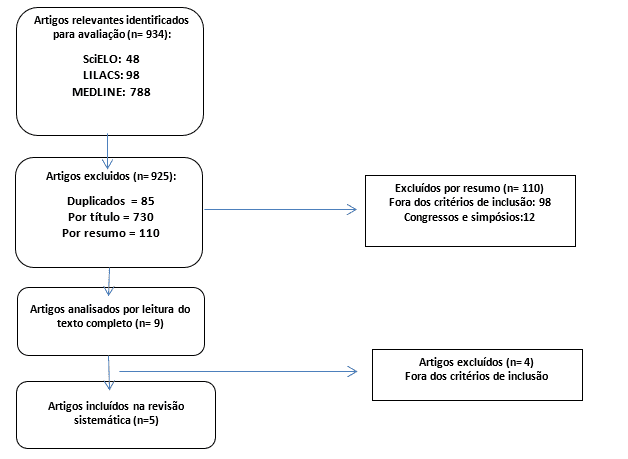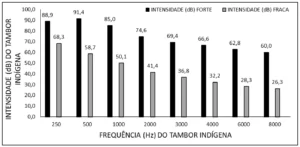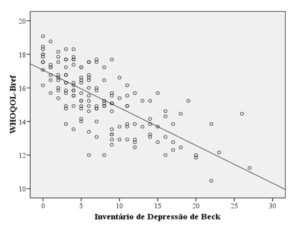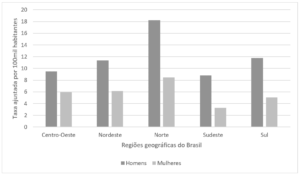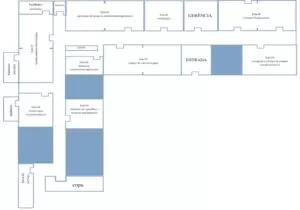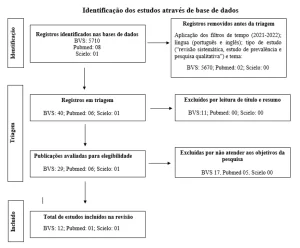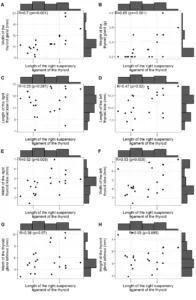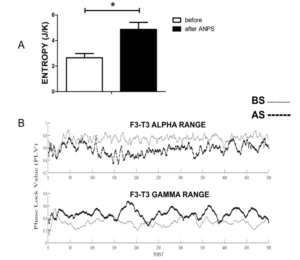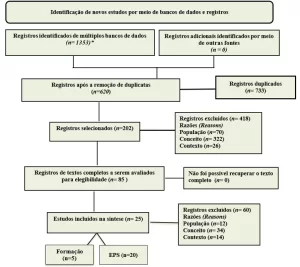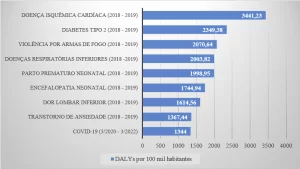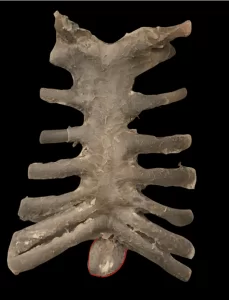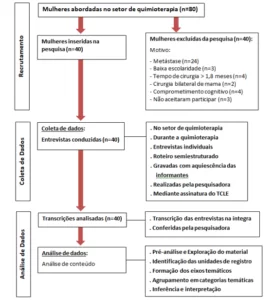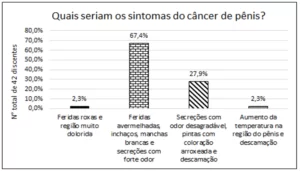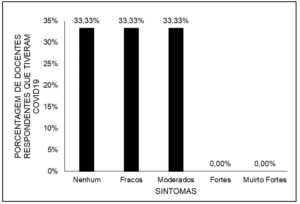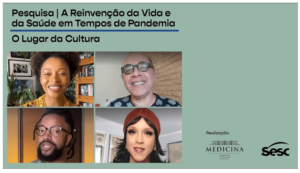REVIEW ARTICLE
OLIVEIRA, Vanessa Cristina de Castro Aragão [1], CORREIA, Kharla Lettícia de Castro Loiola [2], LEAL, Jamile Costa [3], MACÊDO, Maria Gabriela Luz [4]
OLIVEIRA, Vanessa Cristina de Castro Aragão. Et al. Relationship of the “I-God” connection in cancer patients. Revista Científica Multidisciplinar Núcleo do Conhecimento. Year 05, Ed. 11, Vol. 11, pp. 42-55. November 2020. ISSN: 2448-0959, Access Link: https://www.nucleodoconhecimento.com.br/health/cancer-patients, DOI: 10.32749/nucleodoconhecimento.com.br/health/cancer-patients
SUMMARY
This paper is a literature review that addresses themes related to a sense of connection with a being of a higher nature by cancer patients. Objective: to seek the connection relationship “I-God” in cancer patients. Methodology: The searches were performed from publications indexed in the Databases Scielo, Lilacs and Medline, crossing the terms: câncer/espiritualidade/saúde, cancer/spirituality/health and cáncer/espiritualidad /salud. The research was limited to English, Portuguese and Spanish from 2015 to 2020, from September/2019 to June/2020. We found 934 articles, of which seven investigations constituted the final selection for meeting the objective of the study. The analyses for the selection of the articles occurred in three distinct stages. The first phase was carried out by the researchers, based on the subsidies provided by the title and keywords, the second, the second was the reading of the selected abstracts and the third last selection phase, where finally the reading of the papers that provided subsidies to the study occurred. Conclusion: It is observed that in most articles it is reported the belief in God based on faith and spirituality, which shows that it is a favorable support, stimulates people to cure fear and anxiety and is a source of strength for the participants of the researchfound.
Keywords: Spirituality, cancer, public health.
INTRODUCTION
This paper is a literature review that addresses themes related to a sense of connection with a being of a higher nature by cancer patients.
Having a diagnosis of neoplasia generates an immeasurable concussion in the person’s life. To face the conflicting moment caused by the news, individuals with cancer employ various coping tools, with religiosity and spirituality, which prevail in most people affected by this disease.
All conceptions of doctrine act allied to discourses, acts, cults and rituals, as well as other models of religious demonstration, so that the teaching-learning process can be propagated through generations using education and knowledge.
In the Universe there is a very subtle vibration that transposes everything called the divine vibratory plane. Situated below this, is the monodic plan in which the Monacos or Divine Sparks vibrate (PATORINI, 2010)
Yet contact with a being of a higher nature will take place through the vibration of the divine spark that dwells in human beings. Thus, in order to bargain something positive in his favor, the individual seeks the mind-body-spirit interconnection, through something that calls faith, cosmic energy or inner light, often linked to religiosity.
Thus, the man resulting from a divine Spark, with his mind, which is individualized in a Spirit, seeks the path of evolution, because to advance, the Spirit plasmas for himself, by density, a personality (set of intellect, astral, ethereal, and dense physique).
Considering the spiritual being and under the gaze of health, one can think of spirituality based on dialogue and new interpretations. Thus, emerges a theme to be considered that reflects on the spiritual importance of a disease, no longer just subdividing man through dynamic balance mind and body, recommended by Descartes.
Nevertheless, the holistic conception focuses on the perception of man in its fullness thus distancing itself from this very simple dichotomized. In this sense, it is necessary to consolidate interaction between spirituality, within the scope of faith, situated in the scientific field.
Spirituality is the way in which we intest that an intense Energy, which we call the Creator Spirit or God, permeates all individuals and sustains them as an immeasurable system full of meaning and purpose (BOFF, 2010). It is to exist with spirit and, therefore, it is a constitutive greatness of the human being. That is, to live according to the intense dynamics of life. With this it denotes that everything in essence is seen from a new vision where the individual builds his integrality and his connection with everything around him (MULLER, 2004).
In the course of life the energetic process may vary according to its consciousness, which linked to concentration, amplifies the individual’s capacity for internal and external perception.
Consciousness is understood as the combination of everything we pay attention to. Some individuals are defocused by the impasses of the day to day, negative circumstances that, alone, seem irrelevant, but together, they are enough to overload the consciousness (CHOPRA, 2019)
Thus, a person in his healthy conscience, considered normal, cannot be persuaded that free will is nonexistent, the universe operates in accordance with the laws of physics, yet individuals remain free to make their predilections (CHOPRA and MILODNOW, 2012)
The act of concentration depends on a calm, quiet mind, where the frequency of brain waves is found in alpha and these in turn promote a body relaxation where biological restructuring enzymes and tissue regenerations are released.
Mind control is imperative for concentration, meditation, and understanding of the “I”. Krishnamurti (1997, p.56) reports that
what matters, of course, is that each of us can find a perennial state of liberation from all conflicts and the countless reactions that so much chaos produces in the mind; and then, perhaps, with this freedom, we will discover something that exists beyond our minds; but before we can be free, we must certainly understand what the “I” is. […] if a person really wishes to discover, by himself, he must lay the right foundation, and the correct basis is meditation. The correct basis for discovering whether there is a reality beyond the beliefs that propaganda has instilled in the mind of each one, this basis can only be created by self-knowledge. Knowing yourself is, exactly, meditation. To know one’s life is not to know what one should be, because this has no validity or reality, and is merely an ideal idea.
Knowledge of oneself and spirituality are essential sources for us to live in completeness, with self-control generating the fullness of high feelings in the greatest fraction of time, thus corroborating a singular evolution throughout life and in all its context.
Coadunando Datolli (2017) points out that the devotee to self-knowledge and the incessant search for spiritual evolution, concerns several discoveries of the “I”, among them, defects, limitations, barriers, which are particularities need improvement. Thus, it draws attention to the importance of observing the ego and individual thoughts, nourished by the society in which they live.
The ego is responsible for the sense of consciousness and direction of life. The influence of the environment in relation to energy exchange can lead to energy disconnections, enstilling the ethereal body unfurling in diseases reflected in the individual, such as gastritis, psoriasis, cancer, among others.
Realizing one’s patient, in situations of biopsychosocial imbalance, awakens in the human being an intense and desperate desire to approach a being of a higher nature in order to bargain with his healing, but as Pastorini reports (2010, p.11)
Prayer cannot, scientificly and mathematically, reach the plans we desire, because we are “detuned”. It is not about evil or “requirement” of the superior spirits. But it does not reach them our prayer. In the same way that a radio only “shortwave” can not pick up the signals of the “long waves” and vice versa. Each (science proves it experimentally) can only communicate with its likes in vibration.
In view of the context, the objective of the study is based on a literature review, seeking the relationship of connection “I-God” in cancer patients.
MATERIALS AND METHODS
INCLUSION CRITERIA
Inclusion criteria were used for analysis related to spirituality/religion of cancer patients, published between 2015 and 2020 without reservations of age, gender, ethnicity and religious affinity, as well as without restriction to the language of publication.
SEARCH STRATEGY
The searches were performed from publications indexed in the Scielo, Lilacs and Medline databases, crossing the terms: câncer/espiritualidade/saúde, cancer/spirituality/health and cancer/spirituality/health. The research was limited to English, Portuguese and Spanish from 2015 to 2020, from September/2019 to June/2020.
SELECTION OF STUDIES
We found 934 articles, of which seven investigations constituted the final selection for meeting the objective of the study. The analyses for the selection of the articles occurred in three distinct stages.
The first was performed by the researchers, based on the subsidies provided by the title and keywords, where after a thorough search, those that did not fit the researched subject were discarded, were duplicated, those that presented only abstracts and those that, although the title contained one or more words of the search, were outside the inclusion criteria.
In the second, the abstracts chosen with the theme that met the purposes of the investigation were read, with more disposal of material, which did not bring in its content the purpose of the research, passing the third and last selection phase, where the reading of the works that provided subsidies to the study finally occurred.
To better understand the selection process for studies included in the analysis, a schema was performed where one can observe the steps performed in the examination of the articles found in the databases researched (Figure 01).
Figure 1. Selection process for studies included in the analysis.
DATA ANALYSIS AND DISCUSSION
After the search, Table 1 brings the elements of the references, following the proposed methodology. For this, information is provided such as author, country, population, study design and sample selection location.
Table 1- Characterization of the studies included in the literature review
| Authors | Country | Population | Study design | Sample selection location | ||
| N | Average age (years) | Sex | ||||
| MIRANDA, Sirlene Lopes de; LANNA, Maria dos Anjos Lara e; FELIPPE, Wanderley Chieppe | Brazil | 15 | 55 | F-66.7% M-33.3% |
Exploratory | Cancer Patients Support House – Win |
| KUNZ, Josiane Aparecida; CONDE, Carla Regiani; LEMOS, Talita Mayara Rossi; BARROS, Ana Elisa de Sousa; FERREIRA; Maria de Lourdes da Silva Marques. | Brazil | 13 | – | F-100% | Phenomenological | BOTUCCAM (Botucatu in The Fight against Breast Cancer) |
| BENITES, Andréa Carolina; NEME, Carmen Maria Bueno; SANTOS, Manoel Antônio dos. | Brazil | 10 | 57,5 | F-50.0% M-50.0% |
Phenomenological | São Judas Tadeu Hospital/Barretos Cancer Hospital |
| ALVARES, Rafaella Bortolassi; SANTOS, Izabel Dayana de Lemos; LIMA, Nara de Morais; MATTIAS, Silvia Regina; CESTARI, Maria Elisa Wotzasek; GOMES, Natália Carolina Rodrigues Colombo; PINTO, Keli Regiane Tomeleri da Fonseca. | Brazil | 11 | 50 | F-100.0% | Descriptive | Oncology Outpatient Clinic of the North University Hospital of Paraná (HUNPR) |
| SORATTO, Maria Tereza; SILVA, Dipaula Minotto da; ZUGNO, Paula Ioppi; DANIEL, Raquel. | Brazil | 10 | 56 | F-40.0% M-60.0% |
Descriptive and field | large and high complexity hospital in the Southern Region of Santa Catarina. |
Table 2 discusses the titles of the articles and their authors, followed by the results and year of publication, exposing the relevance of the studies that are part of this literature review.
Table 2 -Description of the main findings of the studies identified in the systematic review
| Authors/Theme | Results | Year |
| MIRANDA, Sirlene Lopes de; LANNA, Maria dos Anjos Lara e; FELIPPE, Wanderley Chieppe. Spirituality, Depression and Quality of Life in Coping with Cancer: Exploratory Study | The studied population presented moderate spiritual and religious well-being, which suggests that cancer favors the search for spirituality and religiosity as mechanisms for coping with suffering. The correlations point to a significant search of cancer patients for spirituality and improvement in their quality of life. The support of the spouse, other family members, friends and religious people constitute a social support network for cancer patients. | 2020 |
| KUNZ, Josiane Aparecida; CONDE, Carla Regiani; LEMOS, Talita Mayara Rossi; BARROS, Ana Elisa de Sousa; FERREIRA, Maria de Lourdes da Silva Marques. The Religiosity and Spirituality of Women with Breast Cancer Undergoing Surgical Treatment. |
Breast cancer affects not only the physical dimension of women, but emotional, social and family aspects. In this sense, religiosity and spirituality were alternatives sought by women to face the disease, while faith provided the hope of healing. | 2018 |
| BENITES, Andréa Carolina; NEME, Carmen Maria Bueno; SANTOS, Manoel Antônio dos. Meanings of spirituality for cancer patients in palliative care | The importance of the spiritual dimension in the experience of the dying process was evidenced, enabling the search for meanings for life and death. This study revealed that being before death leads to the veneration of life, referring to personal beliefs and what is sought as meanings for living. | 2017 |
| ALVARES, Rafaella Bortolassi; SANTOS, Izabel Dayana de Lemos; LIMA, Nara de Morais; MATTIAS, Silvia Regina; CESTARI, Maria Elisa Wotzasek; GOMES, Natália Carolina Rodrigues Colombo; PINTO, Keli Regiane Tomeleri da Fonseca. Feelings aroused in women in the face of breast cancer diagnosis. |
The feeling of faith in God, based on beliefs and spirituality, was reported in most of the interviews, demonstrating to be a favorable support, an encouragement to address fears and anxieties, and a source of strength so that the research participants could face the diagnosis, treatment and all the changes generated by the disease. | 2017 |
| SORATTO, Maria Tereza; SILVA, Dipaula Minotto da; ZUGNO, Paula Ioppi; DANIEL, Raquel. Spirituality and resilience in cancer patients. | All patients interviewed consider that there is an influence of spirituality on resilience to face the process of illness and treatment. Faith removes mountains; provides strength, support, and support when we can no longer move forward. God symbolizes overcoming in the face of existential crisis. | 2016 |
The literature approaches ways of coping mechanisms demonstrating how cancer patients support themselves and actively deal with themselves. In this perspective, the subjects experienced a new stage of adaptation, which, in addition to physical changes, alter their feelings and self-knowledge, promoting a connection with a Being of higher nature in a more intimate way. Another focus is the importance of being resilience, because it brings the ability to overcome treatment, recover obstacles and arise life.
Several issues related to spirituality and religious beliefs have been mentioned, where faith, established and strengthened in society, is responsible for rekindling their hope, since they permeate a series of concerns about cancer.
By believing in spirituality they adopt a relationship of power with God, providing them with the desire to improve and even heal themselves through prayer. This intimacy with the Being of higher nature, in the face of insecurity and uncertainty, results in the construction of the warmth of the soul, making faith the only safe and “palpable” point in the field of unpredictability caused by cancer.
The individual with cancer understands religion/spirituality as a support in times of suffering, which becomes vital in the painful treatment of neoplasia. Patients who have this pathology seek the spiritual benefits in their treatments and often see religious groups as a source of support, since this environment is conducive to sharing emotions, pain with them, leading them to feel comforted.
Communication with divinity through prayer strengthens faith, which in turn transcends thoughts and beliefs, amplifies contact with the inner and outer world, transmuting its energy, minimizing suffering, providing subsidies for the feeling of happiness, and minimizing mental imbalance.
When reflecting spiritual practices, important aspects of the life of cancer patients are observed, since they are shared mainly by patients in different places, which reflect common cultural practices, and through uses and customs.
Thus, spirituality through the “I-God” connection provides immeasurable support for cancer patients, providing them with power, which frees them from fear and anguish, and strengthens self-knowledge and living in the faith.
FINAL CONSIDERATIONS
It is observed that in most articles it is reported the belief in God based on faith and spirituality, which shows that it is a favorable support, encourages people to cure fear and anxiety and is a source of strength for the participants of the researchfound.
It is also observed that self-knowledge is a path to be followed to expand faith, belief and connection with the Being of Higher Nature, leading them to spiritual evolution and control of emotions.
Despite the limitations of the research, it is worth mentioning that the results presented constitute religion and spirituality based on faith and that God is a source of strength and hope where healing, grace and miracle are attributed to Him.
BIBLIOGRAPHIC REFERENCE
(OMS/WHO), Constituição da Organização Mundial da Saúde. 1946. http://www.direitoshumanos.usp.br/index.php/OMS-Organiza%C3%A7%C3%A3o-Mundial-da-Sa%C3%BAde/constituicao-da-organizacao-mundial-da-saude-omswho.html (acesso em 04 de 20 de 2020).
ALVARES, Rafaella Bortolassi, et al. “Sentimentos despertados nas mulheres frente ao diagnóstico de câncer de mama.” Journal of Nursing and Health 7, nº 3 (2020): e177309 (1-10).
BENITES, Andréa Carolina, NEME, Carmen Maria Bueno, e SANTOS, Manoel Antônio dos.. “Significados da espiritualidade para pacientes com câncer em cuidados paliativos.” Estud. psicol. (Campinas) [online] 34, nº 2 (2017): 269-279.
BOFF, Leonardo. Ciudar da terra, proteger a vida: como evitar o fim do mundo. Rio de Janeiro: Record, 2010.
CHAVES, Flávio Silva, e Francisco Assis Souza SANTOS. “A espiritualidade e a medicina integrativa no contexto da saúde integral do ser humano.” Estudos Teológicos 57, nº 2 (jul/dez 2017): 382-400.
CHOPRA, Deepack, e Leonard MILODNOW. Ciencia e espiritualidade: dois pensadores, duas visões de mundo. Vol. 1, em Ciencia e espiritualidade: dois pensadores, duas visões de mundo, por Deepack Chopra, edição: tradução Claudio Carina, 321. Rio de Janeiro: Zahar/Sextane, 2012.
CHOPRA, Deepak. As sete leis espirituais do sucesso. 74. Edição: Best Seller. Tradução: Vera Caputo. Rio de Janeiro: Best Seller, 2019.
DATTOLI, Clovis. Longevidade: Como se preparar para uma vida longa e bem-sucedida. 1. Edição: Figurati. Barueri (SP): Figurati, 2017.
GILSON, E., BOEHNER, P. História da filosofia cristã: Desde as origens até Nicolau de Cusa. Petrópolis: vozes, 1988.
KRISHNAMURTI, Juddu. Krihsnamurti, o libertador de mentes. 1. São Paulo: Martin Claret, 1997.
KUNZ, Josiane Aparecida, Carla Regiani CONDE, Talita Mayara Rossi LEMOS, Ana Elisa de Sousa BARROS, e Maria de Lourdes da Silva Marques FERREIRA. “A Religiosidade e Espiritualidade de Mulheres com Câncer de Mama Submetidas a Tratamento Cirúrgico.” Rev. Enferm. Atual In Derme (edição especial N 86), 2018.
MIRANDA, Sirlene Lopes de, Maria dos Anjos Lara e LANNA, e Wanderley Chieppe. FELIPPE. “Espiritualidade, Depressão e Qualidade de Vida no Enfrentamento do Câncer: Estudo Exploratório.” Psicol. cienc. prof. [online] 35 , nº 3 (2015): 870-885.
MULLER, Marisa Campio. “Espiritualidade e qualidade de vida.” Em Espiritualidade e qualidade de vida, por Evilázio Francisco Borges Teixeira. Porto Alegre: EDIPUCRS, 2004.
PASTORINO, C. T. Técnica da mediunidade. 2ª. Sabedoria, 2010.
SORATTO, Maria Tereza, Dipaula Minotto da SILVA, Paula Ioppi ZUGNO, e Raquel. DANIEL. “Espiritualidade e resiliência em pacientes oncológicos.” Saude e pesqui. (Impr.) 9, nº 1 (jan-abr 2016): 53-63.
[1] PhD in Public Health.
[2] Medical School Academic.
[3] Academic of the Medical Course.
[4] Academic of the Medical Course.
Submitted: October, 2020.
Approved: November, 2020.
